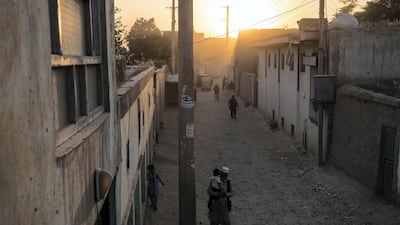Taliban insurgents launched another attempt to capture the northern Afghan city of Kunduz on Saturday as their negotiators held talks with the United States to end their nearly two-decade-long insurgency.
The militants began their attack a little after 1am, targeting the capital of Kunduz province from three directions, and took over residential homes as well as the main hospital.
Afghan security forces retook the hospital by early afternoon, but fighting continued elsewhere in Kunduz, Zaheer Neyazy, a local journalist, told The National.
Afghan officials said they had contained the attack with support from the Afghan Air Force and the US-led Nato coalition forces, with several air strikes in Pul-e-Shenwari, Qahwa Khan and other parts of the city.
Security officials said at least 35 Taliban fighters had been killed in the city, including one commander.
"The commander killed was named Kamel and was head of the Taliban special force called Red Unit," an official with the National Directorate of Security told The National.
“We are continuing our operations and are concerned that the Taliban are hiding in civilian areas and public buildings, showing their inability to fight on the battlefield,” he said.
Kunduz police spokesman Sayed Sarwar Hussainy said nine Afghan security forces were killed. He later died in a suicide bombing that severely injured a police commander, Manzour Stanekzay, who was also providing updates to the media.
Public health officials said eight civilians were killed, including women and children, and 59 were injured.
Telephone lines and internet connectivity remained intermittent, affecting the flow of information about the situation.
US General Scott Miller, commander of the coalition forces Afghanistan, visited the Kunduz along with Assadullah Khalid, acting minister of defence, and Massoud Andarabi, acting interior minister, on Saturday morning in a show of strength and government control over the city.
However, sporadic firing continued around Kunduz until the early evening, according to a resident who asked to be identified only as Ehsan.
“The city is not cleared completely yet. Many policemen have surrendered on the outskirts of Kunduz because they didn’t receive support,” he said.
As in previous Taliban attacks in 2015 and 2016, Kunduz residents fled the city in large numbers, Neyazy, the local journalist, told The National.
“The Taliban opened highways to Baghlan and Takhar provinces for the locals to leave, but not for the security forces,” he said.
“We are scared and people are leaving their homes in the city,” said Obaidullah Ahmady, a Kunduz resident who is also the chief of provincial council. “Taliban have checkpoints from Imam Saheb to the city, and many of our relatives and neighbours are fleeing their homes.”
The Taliban seized Kunduz for about two weeks in late 2015, making it the first provincial capital to fall under their control since their regime was toppled by the US-led invasion in 2001. Although it was recaptured by government and coalition forces, the brief victory and months of siege that preceded the city's fall established the Taliban as a resurgent power.
Mr Khalid, the acting defense minister, played down the significance of the latest attack.
“Let’s not compare this attack with previous ones, because while Taliban has attacked the city, we still have control over it,” he told reporters in Kabul.
“We recently made progress with our offensive and clearances in Badhakhshan province, where we targeted and disrupted larger Taliban bases. This attack was an attempt to distract our resources away from our offensive operations in the north,” he said.
The US envoy in the peace talks, Zalmay Khalilzad, said in a Twitter post that he raised the Kunduz attack with the Taliban and told them "violence like this must stop." He is expected to visit Kabul on Sunday to brief the Afghan government.
The Taliban has continued to launch attacks despite inching closer to a deal with the US after several rounds of talks over the past one year. Both US and Taliban officials have indicated that a final agreement in imminent that will result in a long-awaited ceasefire and pave the way for intra-Afghan talks with the government.
However, the increased attacks on the Afghan population by the Taliban while simultaneously negotiating with the US has raised concerns. Faiz M Zaland, an Afghan political analyst, said the fighting would not end until the negotiations were completed.
“The official agreement is not yet signed, so they are still at war. They will attack each other,” he said.
“As both sides get closer to a peace deal, they will both try to get more aggressive, so as to be able to talk from a stronger position. Also, after the talks with US, the Taliban will hold intra-Afghan talks, which is why they need to be more aggressive to hold a stronger position.”

